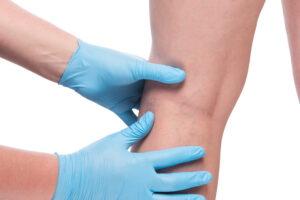
How Do I Know If I Have Varicose Veins?
Varicose veins are known for their obvious bulging and ropey appearance. Because most people imagine them in this way, the other signs of varicose veins may be overlooked. Not all varicose veins can be seen right away, but most can be felt to some degree.
Signs that a varicose vein may be forming include:
- Leg cramps
- Restless legs
- Swollen ankles
- Aching/Pain
- Throbbing
- Tiredness/fatigue
- Heaviness
- Itching/Burning
Varicose Vein Treatment Options
There are two common approaches taken to treat varicose veins. One is to act conservatively to slow down the progression of the condition. This may be achieved by wearing compression stockings and improving lifestyle habits to include more movement. The other approach is to correct varicose veins with medical intervention. There are several options for treating varicose veins. All of the modalities that we offer have been thoroughly evaluated through clinical testing, and each has a history of successful patient outcomes. To that end, it is difficult to say that any one varicose vein treatment is better than any other.
Some of the procedures performed to close varicose veins include:
- Sclerotherapy, a form of injection therapy that closes the vein.
- VenaSeal medical adhesive.
- ClosureFast radiofrequency ablation.
- Endovenous laser therapy, EVLT.
- Ambulatory phlebectomy, a minimally invasive procedure that removes the vein through a tiny incision in the skin.
At the Metropolitan Vascular Institute, our commitment is to provide personalized care to every patient. WHen you consult with one of our specialists, you will receive a treatment recommendation based on your needs and preferences. Contact us today at (301) 374-8540 to schedule an appointment at our Waldorf, MD office.

